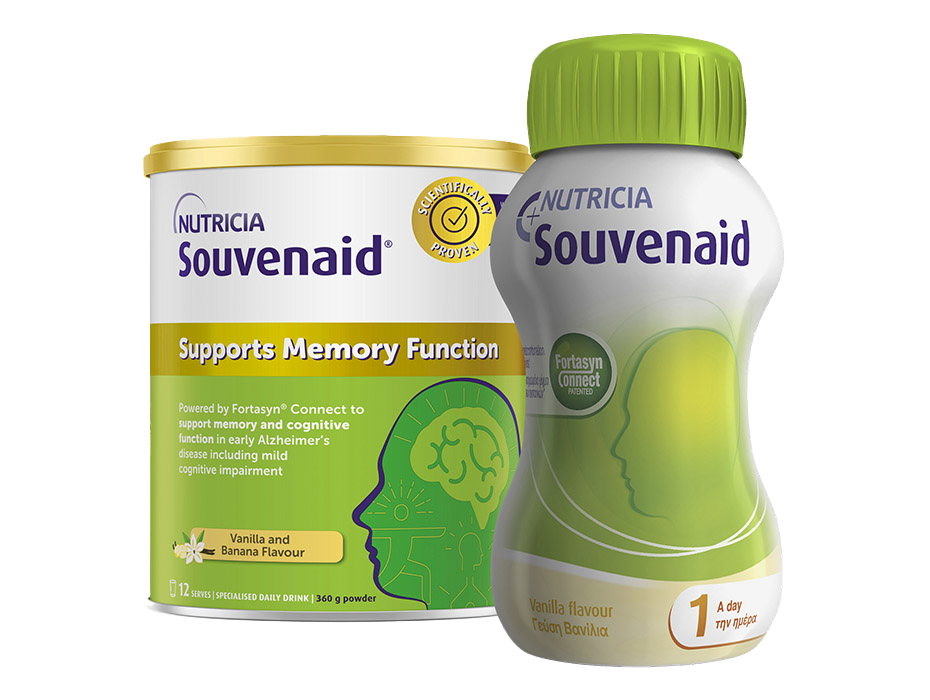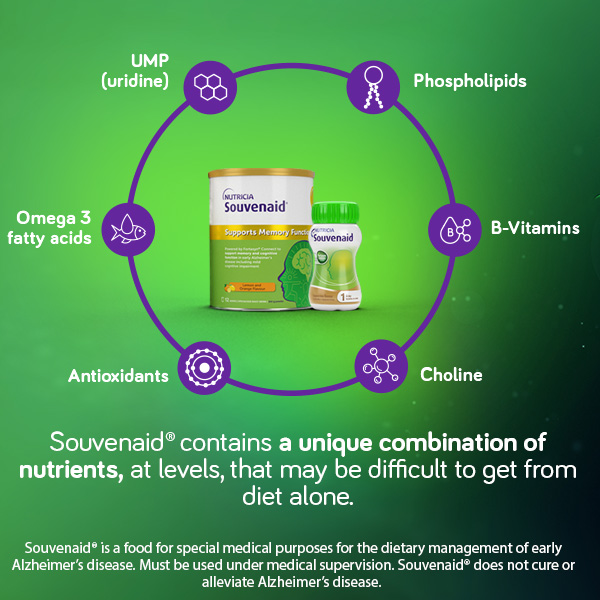How safe is Souvenaid?

We know that people are interested in whether Souvenaid® is safe. Souvenaid is a food for special medical purposes, and studies have found it to be well tolerated1-4.
Souvenaid® is proven to slow memory and cognitive decline by an average of 60% in the early stage of Alzheimer’s disease, known as mild cognitive impairment, when taken daily for 3 years^1.
Souvenaid® liquid has been shown to be safe and well tolerated when used alone or alongside medication1-6 in various studies, and is not expected to cause unwanted symptoms. Souvenaid® is backed by 20 years of evidence-based research, supported by an ongoing research program1-4.
With a positive safety and tolerance profile, Souvenaid® is suitable for various dietary needs:
- Souvenaid® is classified as a low-GI product.
- Souvenaid® liquid is free from gluten-containing ingredients (<20mg/kg).
- Souvenaid® liquid is low lactose (<300mg/kg).
- People with diabetes can consume Souvenaid®. However it does contain carbohydrates and, as with other foods containing carbohydrate, it is advisable for people with diabetes to monitor their blood glucose levels in consultation with their diabetes medical team.
As Souvenaid® has been found to be well tolerated, if you are experiencing any symptoms of concern when taking Souvenaid® we recommend you contact your healthcare provider.
What is Souvenaid?
Alzheimer’s disease affects up to 1 in 12 Australians over the age of 657, making it the most common form of dementia in Australia8. The brain degeneration that occurs with Alzheimer’s disease affects memory, thinking skills, emotions, behaviour and mood. As a result, a person’s ability to carry out daily activities becomes impaired8 over time. Despite this, there is currently no cure and treatment options are limited, including for patients in the early stages of Alzheimer’s disease9.
Souvenaid® is a medical drink that has been formulated to nutritionally support the growth of brain connections10 in patients with early Alzheimer’s disease including mild cognitive impairment (MCI).
Research has shown that people with Alzheimer’s disease, including MCI, often have low levels of some key nutrients including vitamins A, C, E, folate, choline, vitamin B12 and Omega-311. The brain needs key nutrients in the right combination and at the right level to support the formation of new synapses. Souvenaid® has been specially formulated to provide these essential nutrients at levels otherwise difficult to achieve through diet alone, to nutritionally support the growth of connections within the brain, known as synapses10.

Souvenaid is powered by Fortasyn Connect, a unique combination of nutrients to support memory and cognitive function in early Alzheimer’s Disease including mild cognitive impairment.
Fortasyn Connect includes:
- Omega 3 fatty acids
- Antioxidants
- Choline
- B-Vitamins, Phospholipids and UMP (uridine)
Patient Experiences
Our patients report positive experiences with Souvenaid®. Take a listen to Bill’s inspiring, personal story of how he manages his diagnosis with Souvenaid®.
Visit the reviews page to see what other patients and carers think about Souvenaid®.

Learn more about Souvenaid®
For further reading on Souvenaid® check out the following resources
Frequently Asked Questions
Souvenaid® is a Food for Special Medical Purposes for the dietary management of early Alzheimer’s disease including mild cognitive impairment1-3. It must be used under medical supervision.
Souvenaid® liquid has been shown to be safe and well tolerated when used alone or alongside medications 1-6. However, you should always consult your healthcare professional before beginning to use Souvenaid®, or when commencing a new medication alongside Souvenaid®.
Souvenaid® is proven to slow the progression of memory and cognitive decline by an average of 60% over a 3-year period in an early stage of Alzheimer’s disease known as mild cognitive impairment^1.
The effects of Souvenaid® are not instant. It takes time for the nutrients in Souvenaid® to be taken up and used by the body1-3. Research shows that Souvenaid® nutritionally supports memory function in early Alzheimer’s disease when taken daily for at least 6 months1-3.
Souvenaid® is a Food for Special Medical Purpose for the dietary management of early Alzheimer’s disease. Must be used under medical supervision. Souvenaid® does not cure or alleviate Alzheimer’s disease.
Nothing in this article is to be substituted for medical advice, always consult your medical professional for any health concerns.
^Based on a study published in 2021. Individual results may vary. This product does not cure or alleviate Alzheimer’s disease.
References
- Soininen H, et al. 36 month LipiDiDiet multinutrient clinical trial in prodromal Alzheimer’s disease. Alzheimers Dement. 2021;17(1):1-12.
- Sheltens P, et al. Efficacy of a medical food in mild Alzheimer’s Disease: A randomized controlled trial. Alzheimers Dement. 2010; 6:1-10.
- Scheltens P, et al. Efficacy of Souvenaid® in mild Alzheimers Disease: Results from a randomized controlled trial. J. Alzheimer’s Dis. 2012; 31:225-236.
- Shah RC, et al. The S-Connect study: results from a randomized, controlled trial of Souvenaid® in mild-to-moderate Alzheimer’s disease. Alzheimers Res Ther 2013;5(6):59.
- Vinuela F, et al. Assessment of a Potential synergistic effect of Souvenaid® in Mild Alzheimers Disease patients on treatment with acetylcholinesterase inhibitors: An observation, non-intervential study. J. Alzheimer’s Dis. 2021;80:1377-1382.
- Garcia-Alberca JM, et al. Efficacy of Souvenaid® combined with Acetylcholinesterase inhibitors in the treatment of mild Alzheier’s Disease. J. Alzheimer’s Dis. 2023;91:1459-1469.
- Australia Institute of Health and Welfare. Dementia in Australia: Summary report [Internet] Canberra (AU):Australia Institute of Health and Welfare; 2022 [cited 2024 Sept 10]. Available from: https://www.aihw.gov.au/getmedia/5a6b93b1-d819-4221-b2df-f8eac072b28b/aihw-dem-6.pdf?v=20230605171733&inline=true
- Better Health Channel. Dementia – Alzheimer’s disease [Internet]. Australia: Department of Health, State Government of Victoria Australia [updated 2014 May 31; cited 2024 July 12]. Available from: https://www.betterhealth.vic.gov.au/health/conditionsandtreatments/dementia-alzheimers-disease#bhc-content
- Dementia Australia. About Dementia – Alzheimer’s Disease [Internet]. Australia: Dementia & Alzheimer’s Australia Ltd; 2024 [updated 2023 November 24; cited 2024 July 10]. Available from https://www.dementia.org.au/about-dementia/alzheimers-disease
- Sijben J, et al. A multi nutrient concept to enhance synapse formation and function: Science behind a medical food for Alzheimer’s disease. OCL. 2011;18:267-270.
- Mi W, et al. Nutritional approaches in the risk reduction and management of Alzheimer’s disease. Nutrition. 2013; 29(9):1080–1089.
